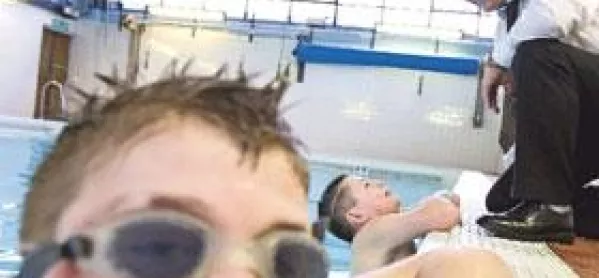What a difference a year makes

A letter from a parent, thanking the headteacher for the transformation in her son, sums up the change in Cartvale School in Glasgow since HMIE published one of its worst reports on a school last year.
Alice Smith, mother of Ian, wrote to Cartvale’s acting head, Danny McGrorry, in the hope that it would illustrate “what an inspiration you and your staff are to the pupils”.
“Since joining the school, Ian’s confidence, social skills and his academics (sic) have improved beyond belief,” she wrote. “Ian feels he’s found a place where he is comfortable, happy and has total trust in the staff, pupil support assistants and the very good friends he’s made. Now that he has staff who understand him and listen to his fears and concerns over his school work, he knows he doesn’t need to misbehave when he is struggling in class.”
What a difference a year has made. Last March, Cartvale, which specialises in teaching pupils with social, emotional and behavioural difficulties (SEBD), was judged to be “weak” in nine areas, “unsatisfactory” in four, and only “adequate” in the remaining four. Staff morale was poor and leadership had “major weaknesses”.
The response from Glasgow City Council was to ask Mr McGrorry, then head of Richmond Park School (for pupils with physical disabilities) to be acting head.
The interim report on the school, published this week, now praises the “good teamwork among staff and their commitment to further improvement”, the positive working relationships between staff and pupils, the “effective pastoral care” towards meeting the pupils’ social and emotional needs, and Mr McGrorry’s high-quality leadership.
Mr McGrorry believes the turnaround in the quality of pastoral care in Cartvale emanates from the “respect and dignity with which these troubled young people are treated”. He has put in place the mechanisms for that to happen - better parental contact, daily pastoral care meetings for staff to discuss each pupil, and greater involvement of pupils in determining the vision and values of the school.
Inspectors point out that better behaviour and more effective teaching is leading to better learning, and they single out the school’s innovative “locational learning” programme as an example of good practice.
Based around Glasgow’s subway stops, locational learning involves pupils and teacher researching the places around each stop. They compare and contrast their expectations with what they find, and then discuss their findings. One spin-off from this programme is that it can be used as a vehicle for social interaction, a particular problem with SEBD pupils.
David, an S1 pupil, sums up the change: “People can come and talk to teachers. Last year, they (pupils) would not have patience with the teachers and the teachers would get annoyed as well. Now, everyone gets on much better.”
Kirkintilloch High shows them how to do it
Two years ago, Kirkintilloch High was heavily criticised by HMIE for its implementation of early presentations of Standard grades. Inspectors cited “insufficient planning” and a failure to meet pupils’ needs adequately.
A year later, the then headteacher had decided to revert to the traditional model for exams, leaving staff confused. The interim follow- through report from inspectors again made sorry reading.
In March, 2007, East Dunbartonshire Council took action and sent in Eddie Muir as acting head. This week, the inspectors’ follow-through report highlighted important improvements to the S1-2 curriculum; very good progress in monitoring and tracking young people’s progress; “exemplary leadership”; more consistent, good-quality teaching; greatly improved staff morale and teamwork among senior managers; and very effective arrangements for self-evaluation and improvement planning.
Mr Muir does not fit the mould of a successful head called in to turn around a school. In fact, he had never been a headteacher before. Nine years ago, he was seconded from his job as assistant head at Bishopbriggs Academy to work on the council’s quality improvement agenda, becoming head of the authority’s quality development service.
He has turned that experience to his advantage and believes Kirkintilloch High’s success lies in its new self-evaluation structures and approach to self-improvement. The school has “How to .” booklets on self-evaluation, which Mr Muir believes are a more accessible version of HMIE’s “How Good Is Our School?’” series.
The attainment figures tell their own story: the percentage of S2 pupils achieving level E has risen between 2006 and 2008: reading from 63 per cent to 73 per cent; writing from 45 to 58 per cent; maths - from 50 to 71 per cent. The percentage of S4 pupils gaining a Credit pass in physics has reached 85 per cent (45 per cent increase); chemistry - 83 per cent (29 per cent increase); and craft and design - 61 per cent (29 per cent increase).
Other measures include the creation of a personal mentoring programme for pupils in middle and senior school regarded as being “on the cusp” - for example, in danger of missing a Credit or General pass, lacking in confidence or being disorganised in their work.
“Mentoring and tracking these pupils’ attainment has had quite an impact,” Mr Muir said, “whether through improved confidence and helping tackle exams more confidently, or better organisation so that deadlines for submission of projects are not missed.”
Keep reading for just £1 per month
You've reached your limit of free articles this month. Subscribe for £1 per month for three months and get:
- Unlimited access to all Tes magazine content
- Exclusive subscriber-only stories
- Award-winning email newsletters